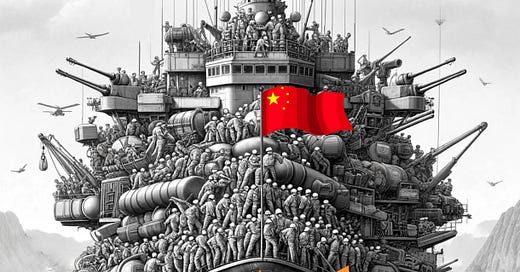Assessing the Stock Market Risk of China Invading Taiwan
This high-profile scenario might be milder than predicted.
In last Sunday’s Kelly Letter, I examined the upcoming January 13 election in Taiwan and possible blow-back from Beijing in the event that pro-independence candidate Lai Ching-te wins. Lai is expected to win, and China is already stepping up its aggression, sending spy balloons over the island.
In this report, I will focus on the likely stock-market impact of a Chinese invasion of Taiwan.
While a cost/benefit analysis of invasion suggests China should put the idea out of mind, Vladimir Putin’s decision to invade Ukraine against all good reason illustrated that rationality does not always carry the day. It’s possible that an aging Xi Jinping could decide to risk it all in a grand finale performance before exiting the world stage.
In their August 2022 book, Danger Zone: The Coming Conflict with China, Michael Beckley (Foreign Policy Research Institute) and Hal Brands (Johns Hopkins University School of Advanced International Studies) argue that China is at a dangerous moment, strong enough to threaten war against the existing world order, but losing confidence that time is on its side. They note: “The greatest geopolitical catastrophes occur at the intersection of ambition and desperation. Xi Jinping’s China will soon be driven by both.” It will lose 70 million working-age people over the next decade while gaining 120 million senior citizens, according to Beckley and Brands in an August 2022 Wall Street Journal essay.
History offers examples of rising powers becoming most aggressive when their fortunes fade, their difficulties multiply, and they realize they must achieve their ambitions while they can or miss the chance forever. China’s economic fortunes are indeed fading, just as the world warms to the idea of an independent Taiwan. Xi appears agitated these days, overseeing a China described by Beckley and Brands in their book as a country that is:
…beset by multiplying problems at home and multiplying enemies abroad. Whatever its propagandists may say, this China will struggle mightily to surpass America over the long term. For that very reason, it may actually be more dangerous in the near future.
Taiwan tops the list of Beijing’s ambition, as explained in the WSJ essay by Beckley and Brands:
Reclaiming Taiwan would eliminate a government whose very existence disproves the Chinese Communist Party’s claims that Chinese culture is incompatible with democracy. It would give Beijing a commanding position in the Western Pacific and terrify US allies like the Philippines and Japan. Not least, it would cement Xi Jinping’s legacy as a leader on par with Mao Zedong. …
Its war plan could well involve a surprise missile and air attack against Taiwan and US military bases in the Pacific, strikes on the satellite communications that underpin the American way of war, and a wave of sabotage and assassinations within Taiwan — all as prelude to a massive airborne and amphibious invasion.
If China finally makes its long-awaited move on Taiwan, would the war crater world stock markets? The prevailing assumption is that it would. The typical case goes as follows:
Keep reading with a 7-day free trial
Subscribe to Wall Street Wink to keep reading this post and get 7 days of free access to the full post archives.





